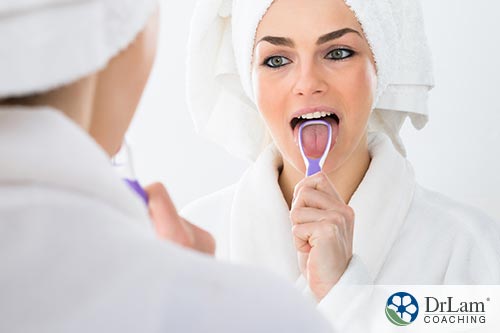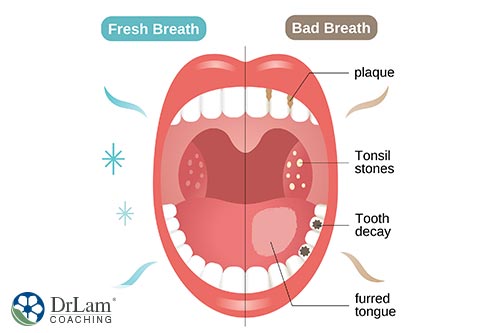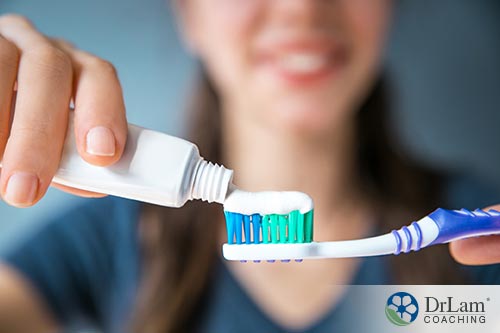 If you suffer from bad breath, swollen gums, or cavities, you are in the company of billions of people throughout the world. However, these oral health problems can lead to systemic inflammation and over activation of your immune system, adding to what can become serious health problems. This is why good oral health is indispensable for a good quality of life. There are many ways to maintain your dental health. Tongue scraping is an excellent way to keep your tongue clean and maintain the balance in your mouth. These are the benefits, risks, and limitations of tongue scraping, and how you can use it for better oral health.
If you suffer from bad breath, swollen gums, or cavities, you are in the company of billions of people throughout the world. However, these oral health problems can lead to systemic inflammation and over activation of your immune system, adding to what can become serious health problems. This is why good oral health is indispensable for a good quality of life. There are many ways to maintain your dental health. Tongue scraping is an excellent way to keep your tongue clean and maintain the balance in your mouth. These are the benefits, risks, and limitations of tongue scraping, and how you can use it for better oral health.
Oral conditions present a considerable health burden in many countries. They impact people throughout their lifespan, leading to pain, discomfort, disfigurement, and even death. The Global Burden of Disease Study in 2017 estimated that oral conditions affect close to 3.5 billion people throughout the world. Caries of permanent teeth is the most prevalent condition throughout the globe.
These oral health conditions include dental caries or tooth decay, periodontal conditions, oral cancers, oral manifestations of HIV, dental trauma, and cleft lip and palate. The vast majority of oral health conditions are avoidable. You can manage them in their early stages by keeping up with your dental hygiene. Tongue scraping goes a long way in promoting dental hygiene and oral health.
Tongue scraping is a way of cleaning the tongue. It removes unwanted particles and bacteria from the top of your tongue. A small, somewhat rounded metallic or plastic tool is used for tongue scraping. It is not a substitute for tooth brushing. However, the benefits of tongue scraping have encouraged oral health experts to recommend we include this essential task in our daily lives.
An accumulation of bacteria and sloughed cells takes place on your tongue with time. Researchers found that the use of a tongue scraper twice a day for seven days can lower the numbers of bacteria such as Streptococcus mutans and Lactobacilli in the mouth. These bacteria types produce foul breath and dental decay.
 The presence of volatile sulfur compounds on your tongue, inflammation in the gums, and cavities can cause halitosis, or bad breath. Researchers have demonstrated significant improvement in tongue coating scores, indicating a reduction in bad breath. Also, the inflammation-causing cytokines in the gingival fluid showed a reduction.
The presence of volatile sulfur compounds on your tongue, inflammation in the gums, and cavities can cause halitosis, or bad breath. Researchers have demonstrated significant improvement in tongue coating scores, indicating a reduction in bad breath. Also, the inflammation-causing cytokines in the gingival fluid showed a reduction.
Tongue coating covers the taste papillae on your tongue and reduces taste sensitivity. This leads to a reduction in the ability of the tongue to differentiate between different taste sensations such as sweet, sour, salty, and bitter. Researchers found that the mean salt-taste intensity increased significantly after tongue cleaning than without cleaning of the tongue.
Deposits of excess materials can change the way your tongue looks. The coating that forms over time can change the thickness and color of the tongue. The consumption of certain foods such as coffee, candies, oranges, beetroot, herbal tinctures, herbal teas, and some juices may also cause a coating on the tongue. Regular scraping can help to get rid of this coating and check its return. This improves your tongue’s appearance and sensation.
You can prevent dental conditions such as caries, gum conditions, and oral cancers. Evidence has revealed the key role of tongue scraping in preventing periodontal conditions and cavities.
In Traditional Chinese Medicine and Traditional Korean Medicine, changes in the tongue body and tongue coating status are indicators of disease. These systems of alternative medicine believe that the tongue is connected to internal organs and reflects internal health. Researchers have suggested tongue coating as the risk factor for aspiration pneumonia in elderly individuals.
Tongue scraping removes microbes from the surface of the tongue and maintains oral hygiene. Tooth cavities, root canal infections, and gum infections are usually the result of inadequate oral hygiene. Tongue scraping can thus help prevent the triggers that lead to an immune response or inflammation in your body.
Inflammation is your body’s response to stress, which can be physical or psychological. This system is referred to as the NeuroEndoMetabolic (NEM) Stress Response. Physical stress can occur in the form of external agents such as infections, injuries, or trauma. Psychological stress occurs as a reaction to an emotional event.
In conditions of acute stress, your body rapidly increases cortisol to overcome the temporary problem. However, prolonged, chronic stress results in a decrease in cortisol production. Adrenal fatigue sets in as the adrenals are unable to cope up with the stress. The hypothalamic-pituitary-adrenal (HPA) axis regulates this process through chemical messengers that determine your cortisol production.
Adrenal fatigue shows different symptoms in different people. The symptoms include:
The NEM stress response is composed of six circuits of organs and systems that work in collaboration against stress. The primary circuit that is activated by poor dental health and inadequate tongue scraping is the Inflammation circuit. A malfunctioning inflammation circuit is a frequent outcome of adrenal fatigue. This subtle kind of inflammation lingers on for years before presenting itself as a symptom in your body. The three components of the inflammation circuit include your immune system, gut, and microbiome.
 Tongue scraping gets rid of harmful bacteria on your tongue. Toxins from these bacteria cannot irritate the oral cavity and interfere with the function of organs.
Tongue scraping gets rid of harmful bacteria on your tongue. Toxins from these bacteria cannot irritate the oral cavity and interfere with the function of organs.
However, when your immune system is weak or underdeveloped, the exposure to external microbes will turn on a response in the Inflammation circuit. Further, indirectly, tongue scraping decreases inflammation.
Chronic stress usually leads to inflammation in your gut in the initial stages. This results in increasing the permeability of your gut lining. The substances then pass through the gut lining and set off your body’s immune system. They may then travel to different organs such as the skin, brain, or heart where they cause inflammation.
When the digestion and absorption processes of your body are defective, it makes it harder for you to get the various nutrients, vitamins, and minerals required for normal function. This triggers conditions such as stomach ulcers, irritable and inflammatory bowel syndrome, or the gastric slowdown leading to irregular bowel movements. Inflammation in the brain results in mental health conditions such as anxiety, depression, and sleeping problems. This occurs in advanced stages of adrenal fatigue.
In this way, tongue scraping, and good dental hygiene in general, works to avoid adding stress to the Inflammation circuit, helping to regulate the NEM response and the underlying adrenal fatigue.
Firstly, you will require the correct tool, such as a tongue scraper, for doing tongue scraping. Tongue scrapers can be made from metals such as copper, stainless steel, or plastic. Most of them are somewhat rounded in shape, and resemble a spoon that is upside down. You can also use a clean spoon or your toothbrush for this purpose. However, they may not get rid of as much bacteria as a tongue scraper.
Here is a step-by-step process for tongue scraping:
One risk is the potential to cut the surface of your tongue by accident. This can be prevented by ensuring that the tongue scraper is smooth and does not have any irregular edges. Examine the scraper before every use to ensure its safety.
You can also activate your gag reflex, which could lead to vomiting while doing tongue scraping. To prevent this, start from the middle of your tongue, slowly coming to your tip. You can start further back as you get used to it.
It is also important to pay attention to the amount of pressure you apply. Avoid damage to your taste buds or injury to the skin by not pressing too hard. Begin gently and slowly raise the pressure.
 Tongue scraping does not provide prolonged decreases in bad breath. For instance, using a tongue scraper in the morning does not check the formation of bad breath later in the day. Bacteria accumulates as you eat and drink, so you will have to scrape after every meal if you are worried about bad breath. Scraping your tongue when you brush your teeth can help check deposits linked to bad breath.
Tongue scraping does not provide prolonged decreases in bad breath. For instance, using a tongue scraper in the morning does not check the formation of bad breath later in the day. Bacteria accumulates as you eat and drink, so you will have to scrape after every meal if you are worried about bad breath. Scraping your tongue when you brush your teeth can help check deposits linked to bad breath.
Similarly, tongue scraping is most effective when used regularly. Researchers have shown that mechanical tongue cleaning with or without chemical intervention can decrease the bacterial load on the tongue. This effect is transient, however, and regular tongue cleaning is required to provide a long-lasting reduction in bacterial numbers.
However, researchers also found that tongue scraping was not done frequently due to discomfort or lack of awareness on the part of dental professionals and their patients.
Another misconception is that the use of a toothbrush on your tongue is equally effective as the use of tongue scraper. Researchers found that tongue scrapers removed 30 percent more volatile sulfur compounds on the tongue than a soft-bristled toothbrush. Thus, while cleaning your tongue with a toothbrush is better than not cleaning it at all, using a tongue scraper increases the effectiveness.
Likewise, researchers have demonstrated that for subjects who brushed their teeth only, there was a significant reduction from the baseline for Streptococcus salivarius only.
In contrast, tooth brushing plus tongue scraping led to a statistically significant decrease from baseline for all bacterial categories. Highly statistically significant reductions were noticed for subjects who performed tongue cleaning with the saliva ejector/mouthwash.
Tongue scrapers are available in plastic or various metals. Selecting a tongue scraper is based on your own choice. Metal tongue scrapers particularly have a longer life and can be safely used in the dish-washer. Those made of plastic are generally less expensive; however, they can wear out quickly.
Tongue scraping is highly effective; however, it produces a positive outcome only when a comprehensive approach for oral health is followed. You can correct your overall oral health by adding the following to your routine:
If you have a thick tongue coating, bad breath, or inflammation of the gums, some steps you can take are:

If you would like to get additional information or need assistance with systemic inflammation caused by dental issues, the team at Dr. Lam Coaching can help. We offer a free** no-obligation phone consultation at +1 (626) 571-1234 where we will privately discuss your symptoms and various appropriate choices. You can also send us a question through our Ask The Doctor system by clicking here.
Tongue scraping improves oral health by clearing bacteria and debris from the tongue. It also improves bad breath, the sensation of taste, and reduces the risk of inflammation in the mouth and carries. However, there is a risk of injury to the tongue or stimulation of the gag reflex, although these risks are minor.
